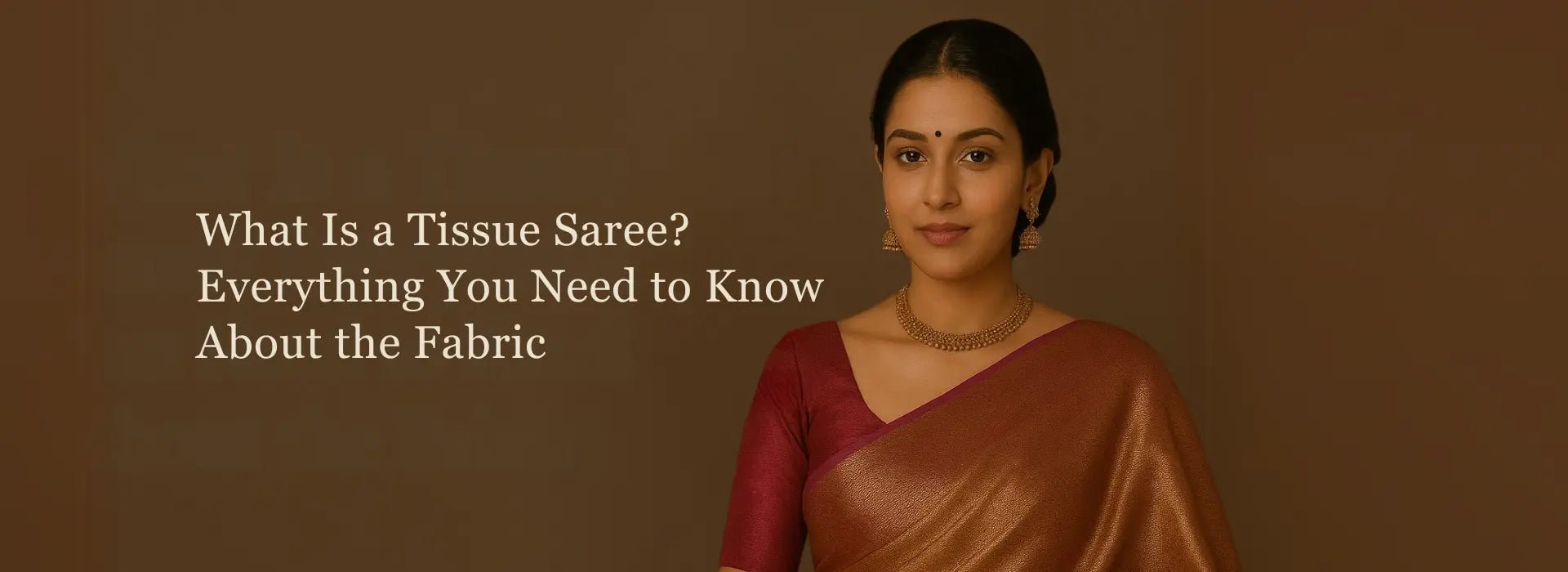Introduction to Tissue Sarees
Tissue sarees embody elegance and are known for their lustrous appearance and featherlight feel. Often chosen for weddings, festivals, and grand occasions, these sarees perfectly balance tradition and sophistication. But what exactly is a tissue saree? How is it different from other silk sarees?
Let's dive deep into the shimmering world of tissue sarees.
Origin and History of Tissue Sarees
Tissue sarees trace their roots to Banaras (Varanasi), India's historic weaving capital. Traditionally, these sarees were woven using pure silk threads interlaced with golden or silver zari, resulting in a gauzy, translucent texture. Over time, regions like Kanchipuram and Chanderi started crafting versions, adding variety to the tissue saree legacy.
What Makes Tissue Sarees Unique?
The Signature Sheen
The glossy shimmer you see in a tissue saree is its hallmark feature. It's this metallic luster that elevates even the simplest drape into a showstopper.
Lightness and Flow
Despite their grandeur, tissue sarees are incredibly lightweight, making them easy to carry even during long events.
Intricate Weaving Technique
Tissue sarees are woven on traditional handlooms where silk threads are wrapped with zari, producing a semi-transparent texture and a gossamer finish.
Types of Tissue Sarees
Banarasi Tissue Sarees

These are often considered the purest form of tissue sarees, with heavy zari work, floral motifs, and regal pallus.
Kanjivaram Tissue Sarees
Combining Kanjivaram silk craftsmanship with tissue's lightweight shine, these are great for bridal wear.
Soft Tissue Sarees vs Stiff Tissue Sarees
-
Soft Tissue Sarees: Easier to drape, ideal for casual events.
-
Stiff Tissue Sarees are more structured and perfect for grand functions and wedding receptions.
Fabric Composition of Tissue Sarees
Silk and Zari Blend
Most tissue sarees are woven with mulberry silk and zari, giving them durability and shine.
Variants with Cotton or Nylon
Modern versions may include cotton or nylon blends, making them more affordable and easy to maintain.
How to Identify an Authentic Tissue Saree
-
Check the sheen: An authentic tissue saree has a subtle yet persistent shine.
-
Touch test: It should feel featherlight yet slightly crisp.
-
Look for weaving irregularities: Handloom tissue sarees will have tiny flaws that add to their authenticity.
-
Zari check: Use a thread test—pure Zari doesn't break easily.
Styling Tips: How to Wear Tissue Sarees Gracefully

Draping Styles for Occasions
-
Bengali Style: For traditional poojas and cultural events.
-
Seedha Pallu: Ideal for showcasing the pallu design.
-
Lehenga Style Drape: Trendy and youthful for receptions or cocktail parties.
Blouse Matching Guide
-
High-neck blouses with embroidery give a royal vibe.
-
Sleeveless sequined blouses for a party look.
-
Choose contrasting colors to make your saree pop.
Accessory Styling with Tissue Sarees
-
Pair with kundan or polki jewellery for weddings.
-
Opt for statement earrings only for a minimalist yet elegant look.
Best Occasions to Wear Tissue Sarees
-
Weddings (yours or someone else's!)
-
Diwali, Durga Puja, Eid
-
Engagement parties
-
Corporate award functions
-
Anniversary dinners
How to Care for Your Tissue Saree
-
Dry clean only for the first few washes.
-
Always store it in a muslin cloth to avoid tearing.
-
Do not iron directly—use a cotton layer between the iron and the fabric.
-
Could you keep it away from moisture and sunlight?
Tissue Sarees in Modern Fashion
Celebrity Trends
Bollywood divas like Deepika Padukone, Katrina Kaif, and Alia Bhatt have all been spotted wearing stunning tissue sarees.
Indo-Western Fusion Looks
Wear a tissue saree with a belt, cape, or jacket blouse for a contemporary twist. You can also style it as a saree gown for red carpet vibes.
FAQs About Tissue Sarees
1. Is a tissue saree suitable for summer wear?
Yes! Tissue sarees are lightweight and breathable, making them comfortable for summer events.
2. Can I wash tissue sarees at home?
It's best to dry clean them to maintain their texture and sheen.
3. What is the difference between tissue and organza sarees?
The tissue is shinier and has a zari base, while the organza is sheerer and crisper.
4. Are tissue sarees transparent?
They're semi-transparent but not revealing when worn with a proper petticoat.
5. Can tissue sarees be worn daily?
They're better suited for occasional wear due to their delicate nature.
6. How can I make my tissue saree look more modern?
Try pairing it with crop tops, belts, or modern jackets for a fusion look.
The Timeless Charm of Tissue Sarees
Tissue sarees are more than just fabric—they're heritage woven with finesse. Whether you're looking to make a fashion statement at a wedding or want to feel regal on a festive day, a tissue saree offers timeless grace with a modern soul. As the demand for handcrafted, sustainable fashion rises, tissue sarees stand out as the perfect blend of tradition and elegance.

